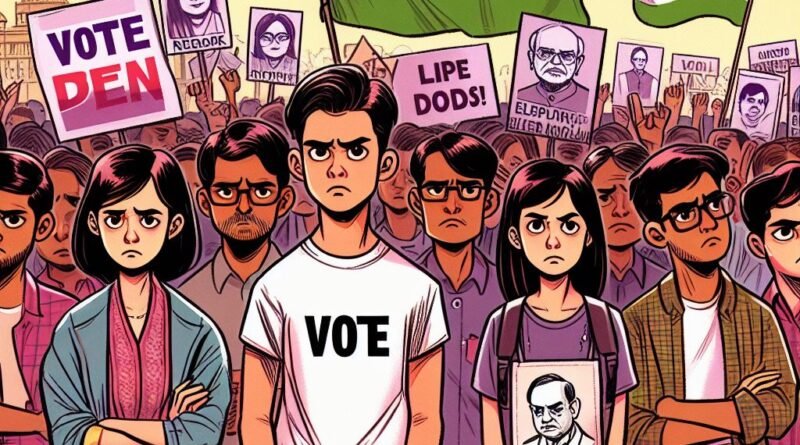Young Voters Show Reluctance in Participation Ahead of 18th Lok Sabha Elections | IAS Banenge
Context:
As India prepares for the 18th Lok Sabha elections, a worrisome trend has emerged: the reluctance of the country’s youngest eligible voters to participate.
Relevance:
GS II: Polity and Governance
READ MORE- Remission of Duties and Taxes on Exported Products Scheme
Dimensions of the Article:
- What Causes the Reluctance of India’s Youngest Voters to Engage?
- The Implications of Voter Apathy for Democracy
- Voter Rights and Responsibilities in Elections
What Causes the Reluctance of India’s Youngest Voters to Engage in Lok Sabha Elections?
Low Registration Rates
- Less than 40% of voters aged 18 to 19 have registered for the 2024 elections, raising concerns about youth engagement.
- Lowest enrollment rates observed in Delhi, Bihar, and Uttar Pradesh.
- Bihar has only 9.3 lakh registered out of a potential 54 lakh (17%), despite its youthful population.
- Similar low enrollment trends in Delhi, Uttar Pradesh, and Maharashtra.
Social Media Exposure but Political Hesitancy
- Despite exposure to political voices on social media, many young people are hesitant to actively participate in voting, even though they are passionate about social action and protests.
Educational System Gaps
- The education system is perceived as inadequate in preparing young people to understand the political process and its significance.
- Insufficient education on civic engagement and voting.
- Lack of critical thinking skills and political awareness in the school curriculum.
Political Disconnect and Lack of Representation
- Political parties often fail to advocate agendas that resonate with the younger demographic.
- Youth are often underrepresented in political decision-making bodies.
- This lack of representation can lead to policies that don’t address the needs and concerns of young people.
Limited Opportunities and Disillusionment
- Limited opportunities for meaningful participation in the political process.
- Disillusionment with top-down decision-making and governance structures.
- Social pressures, stereotypes, and negative perceptions discourage youth from engaging in politics.
- Political focus often shifts from meaningful agendas to money and muscle power, hindering youth participation.
Perceived Irrelevance and Over-reliance on Social Media
- Young people feel disconnected from political issues that directly affect them.
- Over-reliance on social media for information leads to misinformation and superficial engagement with political issues.
The Implications of Voter Apathy for Democracy
Disenfranchisement Issues
- Disenfranchisement refers to the deprivation of voting rights due to legal barriers, impeding citizens’ ability to participate in democracy.
- Many migrants face disenfranchisement as they can’t travel to polling stations where they are registered, requiring proof of a fixed address, which many lack.
- Social disenfranchisement during elections persists despite constitutional guarantees (article 326) that should ensure equitable participation.
Threat to Democratic Principles
- Voter disinterest challenges the core principle of democracy, which relies on active citizen participation.
- Disengaged voters allow a minority to dictate governance, leading to exclusion for marginalized communities.
- Low voter turnout perpetuates inequality and injustice, as the voices of underrepresented groups are unheard.
Legitimacy and Trust Concerns
- Low voter turnout raises questions about the legitimacy of electoral outcomes, undermining public trust in the democratic process.
- When a significant portion of the population abstains from voting, the mandate of elected representatives may be questioned, casting doubt on the credibility of democratic institutions.
Voter Rights and Responsibilities in Elections
Electoral Roll and Registration
- The Electoral Roll updates quarterly, allowing registration for those turning 18 in the respective quarters.
- Eligible youth receive an Electors Photo Identity Card (EPIC) upon registration.
- This applies to those turning 18 by 1st January, 1st April, 1st July, or 1st October.
- Voters can only be enrolled at one place; multiple registrations are an offence.
Voting Eligibility and Identification
- Having a voter ID or Election Commission of India prescribed document doesn’t guarantee voting.
- The name must be on the electoral rolls, and a valid ID is required to cast a vote.
Valid identification includes:
- Electors Photo Identity Card (EPIC)
- Aadhaar card
- MNREGA job card
- Driving licence
- PAN card
- Smart card from Registrar General and Census Commissioner
- Passport
- Pension document with photo
- Identity card from a government agency
- MLA/MP identity card
- A ration card is not a valid identification for voting.
Disqualification Criteria
- Individuals convicted of offences under:
- Section 171E (bribery)
- Section 171F (personation or undue influence at an election) of the Indian Penal Code are disqualified.
- Section 125, Section 135, and Section 136 of the Representation of the People Act, 1951 lead to disqualification.
- Voting in more than one constituency disqualifies the vote.
Voting Process Guidelines
Wrong Button
- If a wrong button is pressed on an Electronic Voting Machine (EVM), approach the polling officer for a reset to vote again.
Refusal to Vote
- Electors can refuse to vote after registering their identities and reaching the polling booth.
- The NOTA (None Of The Above) option allows voters to express a lack of confidence in any candidate.
- The ‘refusal to vote’ option lets an elector shun the entire poll process.
Unauthorised Voting
- Voters can still vote if someone else has already voted in their name by using a “Tendered Ballot Paper” according to Rule 49P of the Conduct of Elections Rules.
- The Presiding Officer will collect and keep the tendered ballot paper separate.
Proxy Voting
- Service voters, such as members of the armed forces, Government employees posted outside the country, and members of the armed police force of a State, can use the proxy voting facility.
- They can appoint a proxy, who must be a resident of the same constituency, to vote on their behalf.
Vote from Home
- The ECI introduced home voting for the elderly and Persons with Disabilities (PwDs) in the 2024 Lok Sabha elections.
- Those above 85 years of age and PwDs with 40% benchmark disability can avail of this facility.
Reporting Malpractices
- Report violations anonymously using the cVIGIL citizen mobile app to capture images or videos of malpractices.
- The ECI guarantees a response within 100 minutes, specifying the action taken.
- The app allows users to report violations, track location via GPS, capture live incidents, monitor complaint status, and report violations anonymously.
-Source: Indian Express




